
|
|
Avatar: The Legend of KorraAlright, this is it. It's finally time to delve into what is perhaps the single most interesting series I've ever watched in my illustrious tenure of being a cartoon watcher. If you're not already familiar with the Avatar franchise by now, color me suprised. But if you are familiar with it, please forget everything you know for a moment and allow me to recontextualize things from square one so you can really understand where I'm coming from and why I feel the ways I do. Buckle up, cause this is gonna be a very LONG review, perhaps the longest I'll ever do.
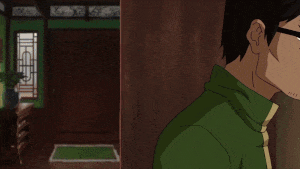 Sit down, shut up, and put your keyboard away, cause there's no comment section here for you to try to prove how much smarter your opinions are than mine. Avatar: The Legend of Korra is one of the most profoundly unique animated series ever produced in America. No matter how you slice it, there is nothing else quite like it on the market. The sheer premise alone sounds utterly insane when you consider the sad state of the animation industry over the past decade or so, and without the backing of its parent series (The Last Airbender), it's a pretty grim chance that a show like this would ever have come to exist on its own, at least not in the four-season big budget capacity that Korra fulfilled. And if streaming media production continues to push in the bleak and often soulless direction it has been lately, I feel it's possible we may never see something quite like it again.
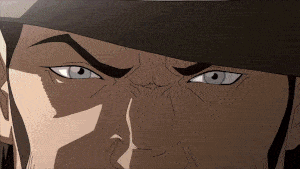 Any time you see a clip of this show on the internet, there's no mistaking it for any other. The Legend of Korra is aggressively itself at all times. If you're unfamiliar with the Avatar universe (the Nickelodeon one, not the James Cameron one), Korra's story takes place in a fictional world largely inspired by Asian nations, including but not limited to: China, Hong Kong, Tibet, Japan, the Philippines, Russia, and Alaska. The setting is vaguely early 1900s, around the invention of the radio, automobile, and electric power systems. A small-ish percentage of people in this world have innate powers that allow them to control one of the four elements (Earth, Fire, Air, and Water - sorry Heart, maybe next time) by "bending" them using martial arts moves. The Avatar is a reincarnating entity who has the power to bend all four elements at once, and is typically responsible for keeping worldwide society - human and spirits alike - in balance.
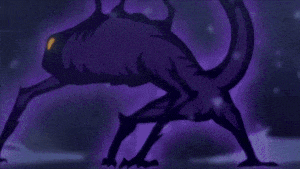 Admittedly, it's not completely unreasonable to think of the Avatar series as a more complex and nuanced take on Captain Planet. The Legend of Korra is a super-sequel to The Last Airbender (again, the animated Nickelodeon series, not the maladapted Shyamalan movie or the live action Netflix series of the same name), taking place roughly 70 years after the first series ended, akin to Batman Beyond vs the 1992 Batman: The Animated Series. It's built upon and occasionally references the original, but it's meant to exist as its own separate story with a different overall vibe. This can be difficult for die-hard fans of the original to grasp, but it's okay that The Legend of Korra feels very different from its predecessor. That's intentional. Now just add in some complex and flawed main characters, nuanced political clashes, and hormonal teen drama, and you can quickly see why it's such a miracle this project was ever even greenlit in the first place.
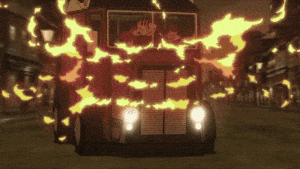 Style AND substance? Something about that has to be illegal, right? An animated series written for a Teen audience set in Swing-era Hong Kong featuring a bullheaded and impetuous muscular brown-skinned girl as the lead, fighting against a litany of various political usurpers? To us as the audience I know that sounds dope as hell, but to executives it probably sounds like a poisonous advertising nightmare. What modern kid is going to be interested in a period drama fantasy full of hundred-year-old technology? What's the easy gimmick for toys and merchandise supposed to be if all the characters fight using martial arts? How do you market something about complex political intrigue and spirituality in a world constantly at war with both concepts? In this new and uncertain era of media companies abruptly axing entire productions for the sake of get-rich-quick tax write-offs, whatever fervent experimental attitude circling around the executives' offices that allowed this perfect storm to brew back in the early 2010s is certainly nowhere to be found nowadays. Then again, I've only just learned about the new "Avatar Studios" production house recently created to feed the nostalgia craze for more Avatar media, which is supposedly developing another new series in the franchise, loosely slated for a 2025 release. Anyway, back to the topic at hand.
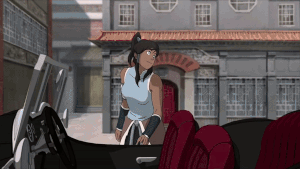 Silly Asami, everyone knows queers can't drive. Forgetting for a moment that this is a "sequel" series, if you had never seen The Last Airbender and jumped right into The Legend of Korra, you would probably find yourself shocked that this series had (and STILL has) a reputation on the internet for being "bad" when it first aired. People were pretty divided on whether or not they liked the main character. They discoursed endlessly over the way the show tackled politics. They wanted and expected the show to have more direct continuation from the first series. The relationship subplot made everyone groan in disgust because I guess people despise seeing romantic drama in any TV show that's not EXCLUSIVELY about romantic drama, as if shows can't ever be multi-faceted or whatever. So many of the show's individual aspects have been derided by critics and fans alike as "bad writing" that it makes my head spin.
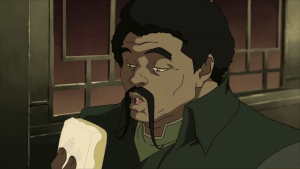 Meanwhile, I'm just over here eating like a queen and enjoying the show... No bones about it, I would call The Legend of Korra one of the most heavily criticized animated shows of the 2010s (and yes, I mean right up there with Steven goddamn Universe), and since I feel like everyone else on the entire fucking internet has already cracked open every single perceived flaw of the series in numerous breakdowns and critiques and YouTube manifestos over the years, I will decidedly NOT be doing any of that in this review. I spent so much of the past decade exhausted from dodging every "The Legend of Korra Is Trash And Here's Why" post or video I encountered that it's going to be hard simply writing this review about the show itself WITHOUT it turning into a big counter-argument for every inane bullet point I've endured listening to people prattle on about. So from this point forward, I'm going to pretend that every flaw of the series is actually a feature, and do my absolute damnedest to simply review it as it stands, so I can underscore why I love the series so much and why I still think it's so goddamn cool that it even exists in the first place. Alright, let's break it down.
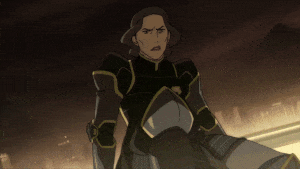 Warning: this show contains too many badass women in it to even keep count of. That's clearly a joke, since there's no such thing as "too many" badass women. First off, it should go without even saying, but the show is drop dead gorgeous. The character designs are amazing, from the reimagined and slightly modernized traditional Chinese outfits all the way down to hair styles and facial details. Not a single character in the entire show feels copy-pasted, and they manage this without the common pitfall of giving the main characters brightly colored hair or extremely standout outfits that you wouldn't see on any other random NPC. Everyone looks recognizably distinct from one another, yet no one looks out of place. Each visual aspect of the show is rich and vibrant, custom detailed to reflect the cultures and time period it's inspired by, from the stunning painted backgrounds and locales to even the regular set pieces like cars and furniture and home decor. Call it a weird thing to gush over, but the stylistic cohesiveness of the show is absolutely brilliant.
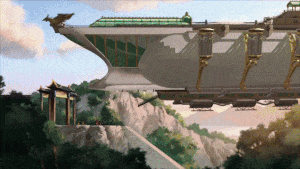 Sometimes you just gotta show up in a giant airship to impress your new girlfriend. And what's a stunning visual aesthetic without equally stunning animation? Characters are expressive and emotive, use a lot of theatrical body language, and in contrast to other American action cartoons - especially modern ones - are still allowed to be cartoony and over-the-top as well. The visual humor is incredible, and borrows heavily from old-school anime without blatantly imitating it too closely. I remember in interviews for The Last Airbender with the series creators and directors that they asked the head artists and animators to watch FLCL for comedic inspiration, and you can see that same approach in full swing here. That level of playfulness really helps set Korra apart from its contemporaries, especially when paired against the show's more serious moments.
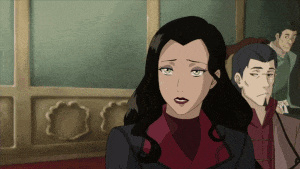 Visual comedy remains the most underappreciated tool in animation's belt, despite it being one of the biggest reasons to use animation as a medium over live action. The fight scenes are even more impressive, combining the best of stunt-based martial arts with imaginative uses for how each given movement interacts with the elements. As with The Last Airbender, the moves used to bend each element are all based on different real-world martial arts styles (e.g. tai chi, hung ga, northern shaolin, baguazhang, capoeira, and MMA-style fusions thereof) to create distinctive and fluid action sequences that never fail to drop my jaw. Coupling all this with the early industrial setting produces an unreasonably cool blend of physical one-on-one fights with larger scale action scenes like car chases, wing-walking airplane fights, and encounters with piloted mech suits. The animators also make incredible use of digital cinematic effects that are still pretty uncommon to see in 2D animation even to this day, like sweeping cgi-driven pan shots and high-fps slow motion. The end result is simply some of the sickest action I've ever seen in any cartoon, bar none.
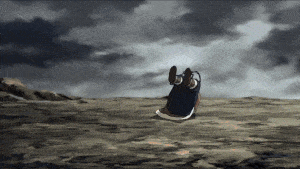 Now imagine how powerful she must be WITHOUT the chains. I also want to briefly highlight the music and audio production. The soundtrack combines traditional Chinese melodies and instrumentation with the more familiar brass and string sections us Americans are used to, and calls on heavy taiko drums and dramatic chants to accent the fights. But during the more casual scenes, these styles are infused with splashes of ragtime and swing jazz to produce a jarringly unique soundtrack that is genuinely unlike any other show on the market. This, along with the excellent voice acting and custom foley effects, seals the deal on the show's stellar production value. And while there are some pretty famous names in the voice cast, it's not their star power that carries the weight of the characters they play. Everyone brings their A-game, celebrity or not!
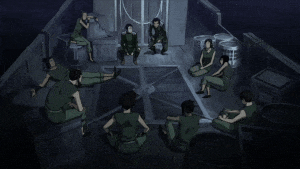 I love pointing out voice cameos the moment I recognize them, same as anyone else, but it's almost even MORE fun when someone plays one hell of a role and you CAN'T identify the voice actor. But of course, aside from all the production aspects, the real meat I want to focus on is Korra's extremely interesting and complex story, and in particular, its commitment to slow burn political intrigue and ideological conflict. Most action shows of this caliber tend to fall back on old classic antagonists: villains bent on subjugation and domination, the destruction of the universe at the hands of a resurrected Chaos Incarnate, or some criminal mastermind playing a mysterious game of 4D chess against the heroes while purposely withholding all information for the sake of some shitty eleventh hour BioShock Infinite-style twist. But not here. Korra regularly finds herself pitted against radical politicians in fights of both a physical nature and a philosophical nature.
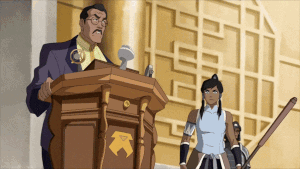 This is both not at all what I meant, and yet also EXACTLY what I meant. The show spends a lot of its time exploring each antagonist's convictions, giving us a clear understanding of why they behave the way they do. Most of them aren't even villains at all, but more like radical activists pushed into committing some kind of terrorism in an effort to make their voices heard. It's often easy to see how circumstances got to this point, and to sympathize or even agree with each antagonist's beef on some level, minus the harm they cause to civilians in the process. And what's truly amazing about it all is that the show does not revolve around Korra simply DEFEATING her enemies, but rather, taking them seriously and keeping them in check while also listening to what they have to say.
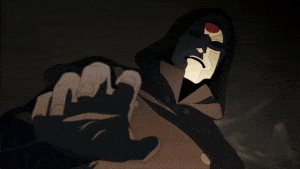 Hands down some of the most interesting and nuanced "villains" ever created. Each season - "Books", they call 'em - focuses on a different antagonist with a different political alignment. There is no central baddie in this story, no singular ultimate entity always watching from the shadows for the series to eventually build up to. Korra's world is a Land of Confusion, with too many people making too many problems (and not much love to go 'round). But as the Avatar, she is burdened with the nearly impossible task of learning to use her immense demigod-like power to confront each enemy and maintain some semblance of balance within society not only in Republic City, but around the entire world. And if that weren't hard enough, she also has to confront her own shortcomings and learn to find balance within herself as well.
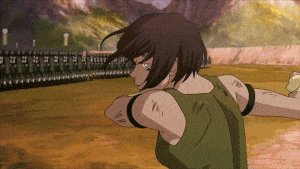 Mastering both body and mind are key elements of the Avatar series, and the extremely cool fight sequences reflect that in spades. This central theme of balance is immediately evident right from the get-go. In Book One, Korra's primary opponent is a mysterious masked man (Amon) who claims his goal is achieving "equality", which he pushes for by vilifying people who can bend the elements (benders) against people who can't. He and his team of ninja-esque "chi blockers" - people who target pressure points on the body to temporarily disable limbs and, by extension, the ability to bend elements at all - seek to start a class war by inciting the people of Republic City via rabble-rousing speeches over the radio, expertly coordinated displays of physical prowess and stealth, and co-opting the language of the people to gain support through a cult of personality.
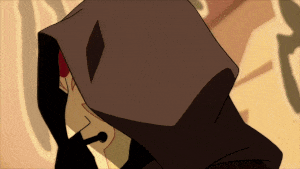 "I exploit you, still you love me, though I tell you 1 and 1 makes 3...". Book One spends a lot of its time exploring this class divide through a beautifully seamless show-don't-tell anthropology lesson. As the stage is set for Korra to arrive in Republic City and immediately butt heads with Amon's followers, we quickly see how this world's technology evolved in tandem with people's bending abilities, and vice-versa. Firebenders who can produce lightning work in power plants charging up huge batteries that supply the city with electricity. Earthbenders who learned to master the metalbending technique pioneered in The Last Airbender often become cops who can fly around by flinging out retractable metal wires like Spider-Man's webs. An entire sport is created using 3-on-3 matches where each player tries to knock the opposing team out of the ring using a different element (not including Air; the previous series was called The LAST Airbender for a reason). It's an astonishingly cool way to not only reimagine the future of the first series, but have these concepts so deeply baked into the history of this world that it forms one of the central conflicts of the new series.
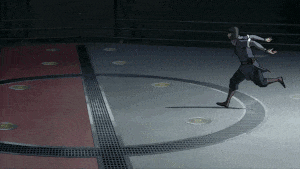 The myriad ways in which the characters use their abilities in everyday life situations is yet another hallmark of excellent writing. With that backdrop in place, Amon's speeches about inequality ring true for the common populace. You can plainly see how non-benders would be disgruntled over benders being prioritized for higher paying specialty jobs, or many of the city's most dangerous thugs and criminals using bending to intimidate shop owners for protection money, and the council that governs the city not having a single non-bender at its table. Despite bending being a time-honored tradition of the many cultures that make up Republic City, Amon seeks to frame THIS as the source of the City's class divide. And by providing an easy outlet for people's frustrations, he quickly becomes a demagogue, gaining power and support through his own intimidating charisma and acts of incited violence. Considering the historical era the show is based on, you can plainly see the Mao Zedong influence and inspiration (especially in the propaganda art), and echoes of this in modern grifter politicians like Silvio Berlusconi and Donald Trump.
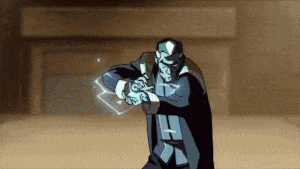 I realize what a stretch it sounds like to use "Amon" and "Trump" in the same sentence, but I don't think I'm wrong here. The inequality theme crosses over into Korra's personal journey as well. She's still a novice Avatar at this point, having spent most of her young life sequestered away in isolated training at the South Pole where she grew up, excelling at the physical aspects of martial arts while struggling to connect with her spiritual abilities. She spends a lot of the first season getting herself into hot water by virtue of being quick to anger, and trusting that she can just punch her way out of her problems. Unfortunately, you can't punch your way through culture wars, and with the Avatar being the ultimate representation of this bending-related conflict, it's a pretty bold way to start a sequel series by having the antagonist suggest that this legendary superhero known for maintaining the balance of the world is now a symbol of oppression who is no longer needed in the modern era. Mind you, all of this only covers the first twelve episodes of the series!
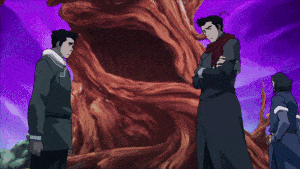 To say the show "goes places" even after all that is an understatement. And on that note, while there is a definite cohesiveness in its central themes and in Korra's own character development, due to the nature of the series' four almost entirely independent seasons, it doesn't unfold at the even, steady pace most of us viewers are used to. The show was originally pitched and produced as a one-season affair - a "what if" sort of sequel imagined after the success of The Last Airbender - but Nickelodeon ordered additional seasons right in the middle of the production and airing cycle, making it difficult for each successive Book to maintain a consistent flow. If you view them as entirely separate story arcs with a buffer in between each one, then it works just fine. But nowadays people generally prefer to marathon through a series as quickly as possible, and the story doesn't hit the same if you just burn through it like it's 52 contiguous episodes instead of 4 distinctly separate seasons.
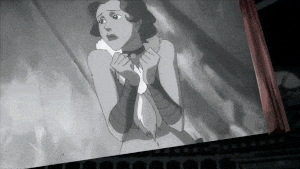 Fun fact: if you put two episodes on two monitors, you can power through the show to get to the resolution you so desperately crave twice as fast! Due to this fragmented nature, there are definitely moments along the way where Korra feels like she's backsliding or unlearning things she just came to terms with a "few episodes" ago. That can be annoying, but keeping in mind that she's a rampaging teenager with a short fuse and self-control issues, it still makes sense thematically. If you've ever known or been a teenager (a teenage girl especially), you'll know that it's a complicated and often infuriating place to be in life. Struggling against a world that constantly berates and belittles you while you're already fighting against your own changing body and mind is hard enough, even moreso when you've got the world laying their expectations on you to mediate between its disparate cultures and political doctrines just like the wise and storied line of past lives behind you did so effortlessly. Name one person who got through their teen years without ever backsliding just a bit! Grappling against her own weaknesses is a key part of Korra learning to find balance within herself, which really comprises the whole axis of the show. Just because it's frustrating doesn't mean it's bad storytelling!
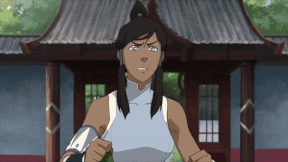 How do you know you CAN'T punch your way through your problems if you don't at least try it first? Up next, in a move even more daunting for Nickelodeon than tackling a story about populism and twisting the words of activists, Book Two's main themes include civil war and theocracy, bringing us an antagonist (Unalaq) who is - for all intents and purposes - a religious zealot bent on pushing his specific vision of spirituality on all nations of the world. Starting small by sowing discord and encouraging in-fighting within his own tribe, Unalaq's religious crusade quickly builds to an all-inclusive cold war driven by propaganda and attempted frame jobs. The real-world parallels for this season are an eternal source of ticking time-bomb tension in America and many other countries around the globe (especially right now in 2024), and seeing an action cartoon engage with these themes so openly like this had me on edge the entire time.
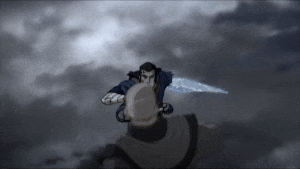 I mean, the ever-mounting production of the fight scenes helped too. Bizarrely, Book Two is widely considered to be the "weakest" season in the entire franchise's history (for what I frankly consider asinine reasons), but there is a hilariously meta aspect to this story arc that I think is lost on most of the naysayers. Unalaq's impressive theological knowledge and deep-seated conviction drive him to dig deep into the Avatar mythos and seek out the original source of the Avatar's power - an ancient spirit of light who merged with a human - then find a counter to it in order to overtake the Avatar and achieve HIS ideal world instead. Effectively, Unalaq wants to become an Anti-Avatar so HE can be the one to fix what he sees as broken under Korra's tenure. An antagonist who thinks he can be a better Avatar than the current Avatar and attempts to rewrite the entire canon to fit his ideal vision of how he thinks Things Should Be makes for an incredible middle finger to the Avatar franchise's more vocal fanatics, while still telling an engaging and politically relevant story!
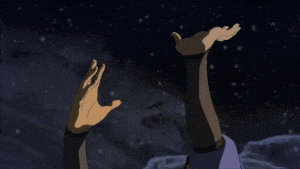 The visual of having the antagonist use calm, almost hypnotic movements as he preaches spiritual "correctness" is delightfully wicked. And for being the "bad" season, there sure is a LOT happening in Book Two that not only weaves an interesting web of conspiracy and drama, but builds on Book One's groundwork and sets the stage for the rest of the series as well. Watching badass normie Asami walk a fine line between business management and public image while an eccentric billionaire runs a successful war profiteering racket to pull the rug from underneath her is the last thing I'd expect from a Nickelodeon series. And the Civil War theme runs deep, plainly reflected in every subplot throughout the season: Bolin starring in propaganda films, Mako joining the sometimes useless police force, the gang's bemoaned attempts at romance, and even familial dysfunction among Tenzin's siblings and children. There is just a stunning amount of complexity to this unfairly-dismissed season that absolutely steamrolled me while rewatching it for this review! Now before I move on to Book Three, I'd better back up for a moment to crack the seal on the cursed tomb of that which people so dryly love to hate to love: love.
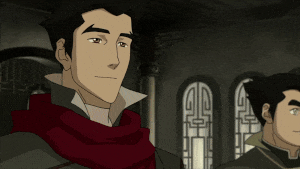 No honey, this show was NOT the inspiration for a Lady Gaga song. Yes, The Legend of Korra is strangely infamous for its minor-but-important romantic subplot. And even though it's such a sore point for everyone who has ever watched the show, I call it a MINOR subplot because the actual amount of screentime spent on kissy-kissy antics is still barely a drop in the bucket compared to the politics, the world building, and the sick-ass fight scenes. I know I'm in the minority here, but I genuinely do not think that the oh-so-despised love triangle detracts from the plot at all. In fact, I'd argue that the relationship struggles run blatantly parallel to each season's individual themes - especially Civil War - and serve to remind us that these characters are not just static chess pieces built to serve a linear narrative about war and conspiracy. They're three-dimensional human beings who experience the full range of human emotions, for better or for worse sometimes. Sure it gets messy, but that's by design! Plus, if it weren't for all the bad romance leading up to the big finale, it would severely cheapen what is ultimately one of the cornerstones of Korra's legacy as a series. More on that later.
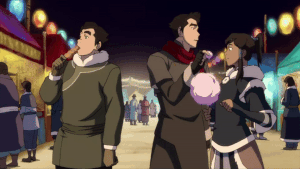 Yes, we know, this scene is cringe. It is in fact SUPPOSED to be cringe. That is intentional. Watching these characters dive headfirst into relationships sometimes feels like watching a train wreck in slow motion, especially if you're one of those annoying know-it-alls who loves blabbering on about how much smarter you are than these characters. Yes, we get it, congratulations on not being a teenager anymore. But whether you're a fan of drama or not, relationships are an intense and irrational part of growing up for most folks, and every "ugh" moment that Korra, Mako, Asami and Bolin experiment with together are things that most real human people experience at some point in their lives. From sending mixed signals to acting on bad advice, heated breakups and shallow rebounds, and deciding to go back to being Just Friends again, our heroes more or less run the whole gamut of relationshit throughout the first two Books of the show. And again, it only takes a miniscule fraction of the series' runtime, but really helps to cement the ongoing themes of each season.
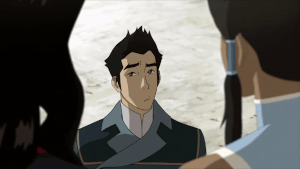 Listen, I love plot progression as much as the next gal, but I wouldn't trade akward scenes of Mako trying to carry on being friends with the two exes he tried and failed to juggle for all the plot progression in the world. That said, Book Three (cleverly subtitled "Change") is where the bubble bursts and things really begin clicking into place. After the religious insurrection brings out Mako and Korra's heated opinions on which side of the cold war to support and pushes them to break up, and Asami - while struggling to take control of her imprisoned father's besmirched business empire as it collapses around her - tries to go in for a rebound and fails when Mako remains indecisive and wishy-washy about his feelings toward Korra, both girls decide it's time to go cold turkey and call it off with him entirely. And in a radical departure from what pop culture has taught us to expect will happen next, Korra and Asami incredibly do NOT enter a catfight over which of them deserves to be with Mako. Rather, they use their shared experience dating him to bond over what an idiot he's been, and grow closer together during the chaotic upheaval brought about by the season's new conflict. Given the "Change" subtitle, the bucking of expected drama tropes, and the sudden shift in team dynamic, it should come as no surprise that Book Three's political theme is anarchy.
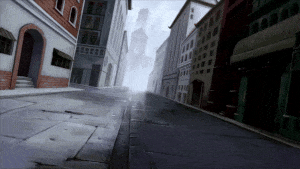 Get in losers, we're toppling oppressive power structures. During the finale of Book Two, Korra chooses to leave Unalaq's portals to the spirit world open, a decision she came to after taking a moment to consider some of the implications of his preachings about humanity's relationship with the spirits. Ultimately, bridging the two worlds allowed energies that had been sealed off to flow freely again, resulting in the restoration of the art of airbending to a small portion of the human population. One such recipient of this ability is a man named Zaheer, a well-read rebel activist already imprisoned for various acts of insurrection, who quickly learns to take advantage of this new paradigm to continue and further his work: the elimination of world leaders in favor of complete autonomous freedom.
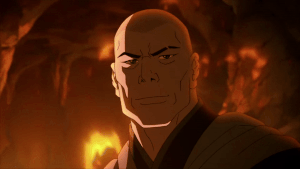 Anarchy, let it flow wild and free... For me, Zaheer was the most unnerving antagonist in the entire series. He's older and warier than Amon or Unalaq, and his strategies are more opportunistic and pragmatic, like that of a typical airbender. Rather than always appearing to be one step ahead, Zaheer's strength comes from his ability to adapt and improvise - often relying on quoted wisdom from ancient philosophers - and the art of airbending comes naturally to him as it directly reflects his own personality. Throughout both series, airbending often feels like an overpowered skill for our protagonists to use, if only because airbenders are so few in number (and have been for 170+ years at this point) that no one alive really knows how to counter their tricky and often unpredictable attack patterns. There is a beautiful poetic justice in giving this untethered, free-moving ability to a radical anarchist, even moreso when he is set up as an antagonist, given the way The Last Airbender spent so much energy framing the entire airbending nomad population as completely peaceful* and all but devoid of any conflict whatsoever by virtue of their ascetic and deeply spiritual culture. *That's not to dismiss the fact that the Air Nomads were unfairly genocided by a power-hungry military dictatorship, but rather to examine the notion that no collective nation or group of people can EVER be 100% without conflict or incapable of antagonism.
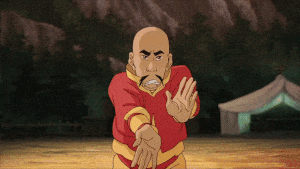 I'm telling you, the attention to subtle detail and clever visual gags in this show are simply unmatched! As Zaheer and his old crew of fellow free radicals - now freshly broken out of their personalized maximum security prisons - get to work making a calculated terrorist strike against the monarchy, we see the flip side of anarchy explored in many of the season's B-plots about the sudden emergence of all these new airbenders who are now actively seeking direction, purpose, and mentorship to understand their new powers. While we can clearly see that Zaheer's beliefs about the archaic and unnecessary nature of the greedy ruling class ring true, it's also evident that not everyone is cut out for autonomy or oneness like he is. It's hard to disagree with him in the face of outright villains like the Queen of the Earth Kingdom, but it's also hard to agree with him when he insists he's acting in EVERYONE'S best interest by erasing leaders as a concept altogether. Zaheer even seems to be aware of this paradox, but from his point of view, he can see no other way to actually kickstart any meaningful change without getting violent first.
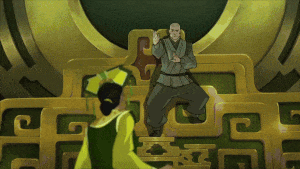 I'm still in awe of this scene being a Nickelodeon production, even if this episode came out just after the switch to online streaming only and never actually aired on the network TV station. To put it bluntly, this is one of the more realistic and accurate depictions of anarchy I've seen in any show. In and of itself, anarchy is not simply Chaos - or the absence of Order, for that matter - but rather, is the result of a deliberate attempt to bring about a necessary change in a broken system, usually through destructive or radical means. Zaheer's attempt to dethrone the queen and destabilize the Earth Nation comes not from a desire to take control or plunder and profit, but to tear down the oppressive structure of the so-called "ruling class" and force the nation's citizens to learn how to govern themselves. This is further supported by the other major subplot of the season, centering on an estranged family relationship between strict city police chief Lin Beifong and her more liberal half-sister Su Yin, acting matriarch of a standalone city made entirely of metal. Both sisters walked their chosen paths in life as a result of a dysfunctional upbringing under their mother - also a police chief, and the innovator of metalbending as a concept. And while neither of their lifestyles are portrayed as entirely perfect or ideal, it's plain to see how anarchy helped them break out of the broken system they grew up in and allowed them to pursue lives that better suited their needs, and how all of this ties back into the central theme of Balance.
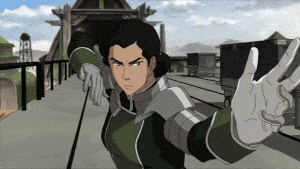 Explaining the inclusion of metalbending as "bending the tiny fragments of unrefined earth still present in impure metals" ended up being the perfect gateway for concocting some of the absolute sickest fight scenes I've ever born witness to. One other thing that really makes this season shine is Zaheer's relationship with his cohorts (collectively, the Red Lotus), especially compared against Korra and the way her own team has been drifting apart. Each member of the Red Lotus is an elite bender with a unique and fearsome skill that - coupled with their extremist ideals - likely branded them all as dangerous freaks, and Zaheer's practical leadership and commitment to his beliefs provides them all with a sense of purpose and family. He and psychic demolitions expert P'Li even share an ill-fated romance together, leading to one of the most impactful and heart-breaking moments of not only the series, but the entire Avatar franchise itself when Zaheer finally understands the implications of the airbender philosophy he's been spouting about letting go of everything still tying him to this world. The Red Lotus' whole team dynamic creates a perfect foil for Korra's crew, and given their underlying desire is ultimately just to enact a meaningful change in the world at large, it's sometimes genuinely hard to root against them. That is, of course, until Zaheer reveals that eliminating "world leaders" also means eliminating the Avatar.
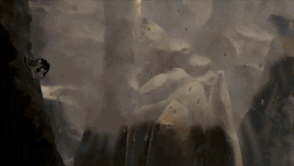 ...anyway, good luck out there buddy. You're gonna need it. Book Three is generally regarded as the high point of the series, and although this season also offers some of the biggest payouts and callbacks for people who have already seen The Last Airbender, it's the complete shakeup of the series formula that sells it, making the "Change" subtitle truly earned. But if Book Three is the crest of the roller coaster ride, then Book Four is the equally exhilirating downhill rush that follows after. And even though it takes us to some of the lowest, darkest places the series has ever gone, it's the point at which things finally coalesce into their satisfying conclusions, and make the whole journey of watching the show feel complete and worthwhile.
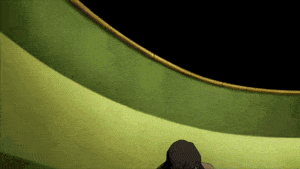 The key to understanding the endless battle against your own self-worth lies in the subtle difference between the phrases "stop hitting yourself" and "stop beating yourself up". Thoroughly ravaged after her epic showdown with Zaheer, and now fighting against the long-term damage dealt by a deadly poison he injected into her bloodstream, Korra spends most of Book Four at her absolute weakest point, disabled in body and disheartened by her inability to be useful as the Avatar. This season's primary focus is centered on Korra's journey to recovery and battle with self-worth. And while there is a standard human antagonist with a clear -ism to be grappled with (military elite Kuvira and her brand of Nationalism), Korra's main foe this season is perhaps one of the most difficult adversaries a person can ever face: physical and mental rehabilitation in the face of three seasons worth of post-traumatic stress disorder.
 The use of both philosophical balance - i.e. mind and body being equally important aspects of oneself to keep healthy - as well as regaining literal balance through physical therapy is such an excellent understated touch. Haunted by the specters of her enemies, having nearly faced complete erasure as a bender, as the Avatar, and as a human being, Korra drops off the grid for the next several years, right in the midst of the queen-less Earth Nation in upheaval, the revival of the Air Nomads, and Asami's growing success as a business owner undoing the damage to her family's company name. Feeling useless as she reads of her friends' success without her, Korra decides once she's finally well enough to be moving around on her own to simply disappear on a journey across the globe, seeking purpose in a world that continually insists it doesn't need an Avatar anymore. During her absence, Kuvira - one of Su Yin's elite guards assigned to help clean up the unrest and banditry in the Earth Nation in the wake of the recent regicide - begins assembling a powerful army of top tier metalbenders in a bid to stabilize the nation by her own hand. In stark contrast to Zaheer's ambition, Kuvira follows in his footsteps to erase the monarchy as a concept, but pulls a hard 180° on his philosophy toward the opposite extreme, creating a Nationalist dictatorship built on blind devotion and loyalty to the Nation above all else. And anyone who refuses to pledge their loyalty is branded a traitor and subject to military retaliation or imprisonment in a "re-education camp". Yikes.
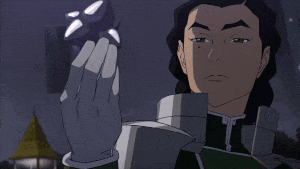 I'll bet Kuvira got this powerful by grinding Metal Slimes for easy EXP. The subplot for this final season follows Mako around as royal bodyguard to the now trivial Prince Wu, a self-absorbed cringelord playboy and heir to the defunct throne of the Earth Kingdom. After Kuvira refuses to step down as military commander to allow Wu to accede the throne per tradition, Mako and Bolin begin to butt heads over which side of the conflict to take, arguing whether 'tis nobler to side with a clearly corrupt line of selfish monarchy or be a loyal dog for the fascist's army. What's interesting is the way the show goes out of its way to highlight supporters for both causes, arguing for loyalty in the name of tradition and culture, as well as loyalty in the name of unity and purpose. But as the "Balance" subtitle implies, a mediator for the middle road is clearly what's needed here. Meanwhile, Korra's inability to let go of the past reaches its boiling point when she is no longer able to connect with her deepest powers as the Avatar. A familiar face from The Last Airbender pushes her to confront her fears head on using the only method that really works - and also the true underlying theme of this season - putting in the hard work.
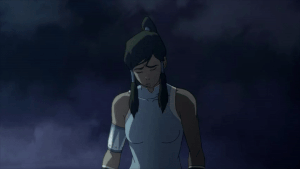 And major props to the storyboarders and animators who put in all the hard work of making this show so visually entertaining! What I love about this season is the way it tackles self-worth and mental health in way that is both grounded and realistic, yet still flashy and metaphorical for the sake of story-telling. Korra's inability to move past what happened to her stems from a stress response wherein her fear of re-living that trauma becomes a crutch for never getting over it. This is a very real stumbling block that many people encounter on their road to recovery, and sometimes there are multiple angles and methods through which that trauma must be processed in order to overcome it. It's hard and bitter work for Korra to convince her body that these fights are over, and that she is not in danger from them anymore, but it's the only real way to get the job done. It ultimately takes half the season for her to truly get back up to speed, but that's the point. It's never easy. And, having now tread that road, Korra can finally begin to understand what each of her enemies must have been going through to end up where they did. Not only can she learn from each of their ambitions and ideologies, but now she can relate to their struggles as well. In particular, Kuvira's desire for control in a nation collapsing around her isn't too far a cry from Korra's own battle, and after the climax of their absolutely bonkers final showdown together, Korra is able to use this analogy to talk Kuvira down and force her to surrender.
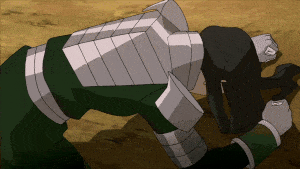 Seeing is believing, but only once you figure out the meaning of what you're seeing. This is all not to mention the wildly fascinating sci-fi angle Book Four takes, combining the increasing complexity of metalbending and electricity usage to create mech suits with unholy experimentation on spirit portal vines that end up creating weapons of mass destruction. To jump from The Last Airbender's simple "Journey To The West" style of storytelling to The Legend of Korra's anachronistic alternate history of Swing-era Hong Kong, then into all-out retrofuturist techno-magical madness - all while never losing the core aspects of the show's identity and the stylized fight sequences it was built on - makes for a mind-bending spectacle of entertainment that tickles my imagination pink, just like wild anything-goes cartoons of yesteryear I grew up on. Yes, I'm talking about ThunderCats again, for the hundredth time. Sorry. It WILL happen again.
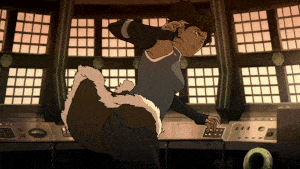 The sheer concept of metalbending fights brings a whole new level to the phrase "metal as fuck". And of course, equally important for this season and the series as a whole, is nailing down whatever happened with all that bad romance nonsense that all but disappeared after the big breakup in Book Two. Throughout Book Three and Four after Korra returns to society, we catch a clear glimpse of her and Asami hitting it off as they spend more time together and away from Mako. And perpetual loveless dumbass though he is, Mako's keen detective skills pick up on something definitely going on between them now. After all, Asami was the one who stepped up to help take care of Korra when she was confined to a wheelchair, and was the only person Korra felt comfortable writing back to during her depressive days post-rehab. In the show's very final moments, fan favorite agents of chaos Varrick and Zhu Li get married. During the party, after a masterful fakeout scene with Mako pledging his allegiance to Korra in the name of their deep friendship instead of attempting to rekindle their romance, Korra and Asami dip out to go have a private chat for a moment. They agree that after everything they've been through, they deserve to spend a private little vacation together, somewhere no one can bother them for a while. As the climactic music swells, the series ends by cutting to a scene of Korra and Asami walking together into a spirit portal, hand in hand. They turn to face each other in a direct parallel to the wedding scene just minutes before, and the camera slyly pans up past them and into the light to show "The End", leaving the rest to obvious interpretation. And while Nickelodeon still ultimately decreed "no kissing though", this is easily the gayest thing they've produced since that time Debbie Thornberry had a crush on that dolphin girl oh so many years ago.
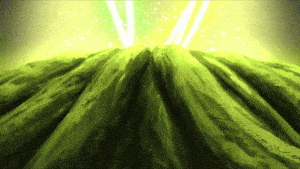 By all means, please keep trying to suggest as many rationalizations about female friendships and holding hands as you can, but I guarantee you're not fooling anyone. Now, it's not just the fact that we end on a legit girl/girl romance that makes this scene so legendary. It's the fact that none of it could have happened WITHOUT the universally-despised love triangle shenanigans that preceded it all. For being the show's sore point, it's one of the most down-to-earth and mature resolutions to teenage drama I've ever had the pleasure of watching. I remember at the time that many of my friends dropped the show altogether in Book Two, frequently citing the romance as one of the big reasons, only to eventually come back around on it after they heard about Korra and Asami ending up together. I suppose that's understandable, given how often love triangles are either poorly managed or milked across a million seasons with no resolution in other big-name TV shows. But to those who gave up on this show mid-way, I feel bad that they didn't get to experience the sheer catharsis of seeing this resolution play out the way it did. It's truly exceptional, and in my opinion deserves more praise than most people seem to be willing to give it.
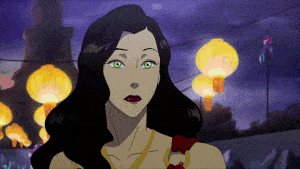 The destination means nothing without experiencing the journey it took to get there. Alright, time to sum this baby up. Having laid it all out like that, it should be plain to see now why The Legend of Korra is so deeply special to me. It's such a rare breed of series that defies so many conventional expectations in the world of American animated series, from its unmatched visual identity to its complex take on politics to its unabashed queer-friendly ending. But, as I've tried - and surely failed - not to mention throughout this whole diatribe, one of the biggest reasons I've taken the time to write this long-ass Review was to reaffirm my feelings about it in spite of the snooty and often vitriolic opinions of the show I've been forced to listen to ad infinitum since DAY FUCKING ONE of the series airing.
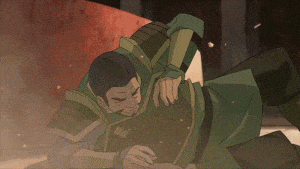 I'm tired of all the back and forth. This show rocks, plain and simple. Frankly, my strong opinions about The Legend of Korra are one of the main reasons this whole section of my site even exists in the first place. I'm tired of the endless spiral of discussion and debate that spawns out of every big name series in the world of terminally-online Cartoon and Anime fans. This private space I've created is where I get to voice my own thoughts, free from the trappings of social media and public forums, and preserve them to remind myself why *I* loved these shows so much, everyone else's feelings be damned. Genuinely, I believe there's an incredible power in simply engaging with a piece of art - popular or obscure - entirely on your own terms. I could never last as a "content creator", making clickbaity engagement traps that distort or misrepresent my actual feelings on the show in hopes of acquiring some hate-click ad revenue. I can't even bring myself to award scores or make Top Ten listicles. I write my Reviews solely because I love analyzing my own thoughts on a piece of art, and then promoting that to help others see what I saw. And while I enjoy sharing my opinions, I only want to do it in a way that does not require me to buy into popular opinion as fact, or make wild incendiary claims to grab people's attention. I strive for genuinity, and I thrive on it as a result.
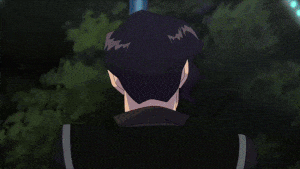 Levity is a precious commodity in the world of animation, and I do my best to cherish every bit of it. Phew! We've finally reached the end of the review, where I make some comparisons and recommendations for similar series. Given its strong and unique identity, it's hard to nail down a perfect rec, but here are a few places you could start. If you liked Korra's wild alternate history take on an early 1900s Asia setting, Samurai Champloo and Baccano! should definitely pique your interest. You may also like a more recent anime called Joran: Princess of Snow and Blood, though as the name implies, it's significantly more violent. If you liked the ideological and political aspects of Korra, you MIGHT also like Gatchaman Crowds, though the overall genre and tone of that show are very different. She-Ra and The Princesses of Power and the aforementioned Batman Beyond are probably also good bets if you're looking for more shows about teenagers fighting against things bigger than themselves.
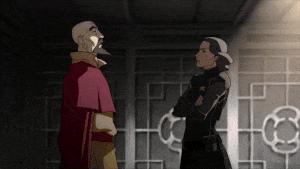 Oops, almost forgot! Can't write a review for The Legend of Korra without using this iconic gif at least once! In closing, I'm tired of being bitter about this show's reputation on the internet. It blew me away back when I first watched it, it still blows me away even now, and I'll be forever dumbfounded by the popular opinion of it being considered "good but not AS good as The Last Airbender". If you've bothered reading this far and I've somehow successfully changed or at least recontextualized your opinion of the show, I'm glad. I hope Reviews like this will convince you to be more receptive to and analytical of the shows you watch going forward. This has been utterly exhausting to write, so I hope you won't expect this level of extreme detail for every one of my Reviews! But for Korra, it was all worth it. I stand by my fighting words when I say that this is STILL one of the most incredible animated series I've ever watched, and - as far as I'm concerned - of all time.
|
|